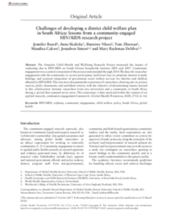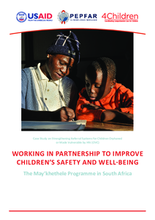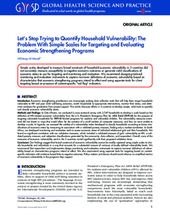childrens_living_arrangement
children_living_without_bio
Displaying 141 - 150 of 324
This narrative documents the experience of researchers with the objective of documenting lessons learned in the Amajuba Child Health and Wellbeing Research Project, a collaboration between researchers from two universities and a community in South Africa which measured the impact of orphaning due to HIV/AIDS on South African households between 2004 and 2007.
This chapter looks at what the international law instruments recommend regarding the appointment of legal guardians. It provides an audit of the instruments which are applicable to the regulation of the appointment of legal guardians for children both at the global and regional levels.
This paper serves to illustrate challenges in research on care-leavers and the various ways that research results can be interpreted by drawing on data from a study being conducted in a residential care programme in South Africa.
This article examines the care experiences of former looked‐after children from a residential care setting in South Africa.
The Amajuba Child Health and Wellbeing Research Project measured the impact of orphaning due to HIV/AIDS on South African households between 2004 and 2007. Community engagement was a central component of the project and extended through 2010. This article describes researcher engagement with the community to recruit participants, build local buy-in, stimulate interest in study findings, and promote integration of government social welfare services for families and children affected by HIV/AIDS.
This case study is one in a series of case studies highlighting different aspects of a case management system and referral mechanisms utilized by OVC programs. The case study looks at the work of the Children in Distress Network (CINDI) in the uMgungundlovu District of KwaZulu-Natal Province (KZN) of South Africa.
925 children in Gauteng, South Africa have been left in institutions, primarily child and youth care centres (CYCC), as they await placement into foster care by the Gauteng social development department, according to this article.
This article discusses efforts in 3 countries to develop simple, valid tools to quantify and classify economic vulnerability status.
This policy brief draws from the findings of a study which investigated the academic performance of orphaned learners aged between eight and ten years from ten public primary schools in Mankweng Circuit of Limpopo Province, South Africa.
Eight Zimbabwean children were taken into the custody of South Africa's Department of Social Development after allegedly being smuggled into the country in a truck, according to this article from Ground Up.




